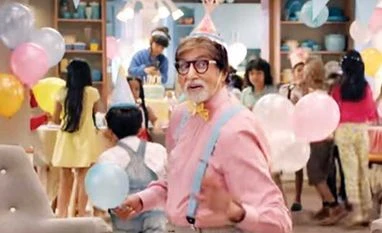The company that has just launched a celebratory campaign with Amitabh Bachchan says that ten years down the line, it is focused on establishing its service advantage. And that means improving its Video-on-Demand (VoD) facility for mobile phones. The ultimate aim, he says, is providing existing customers an additional screen at no additional cost. Is it not too late for Tata Sky to join the video revolution?

Playing the service card
It is important for Tata Sky to establish its hold over the video market if it wants to keep customers engaged, for almost every viewership analysis shows the rising power of the moving image on small screens. Nagpal says that Tata Sky's goal is to go beyond just distributing channels on its platform.
He realised, he says, that his subscribers are screen agnostic when it comes to consuming entertainment, which is what nearly 80 per cent of the people watch. No brand can ignore a message if it is this loud. VoD, given its growing popularity with a large segment of viewers seemed like the best way to sharpen the brand's edge.
"I see VoD in two forms - one is live TV or TV on-the-go and the other is catch up television," says Nagpal. VoD is still a small market for the company but it is growing rapidly. According to Tata Sky it is the only DTH player to have over 50,000 downloads a month. The VoD library, apart from the live TV portfolio (which includes all channels on a Tata Sky subscription), stands at around 3,500 titles, including almost 2,000 movie titles in various languages.
In an ideal world, customers would have to subscribe to these services on their phones, but given the fierce competition, that is a distant dream. In fact this is a defining characteristic for the industry; services paid for in other countries go free in India and companies can keep their nose ahead in the race only by continuously upgrading their services without charging their consumers.
It is because of this challenge that Tata Sky has ended up investing ahead of the curve, he says. At the moment, the company is just looking at offering these services to its existing consumers. "I am not looking at these services from a customer acquisition point of view, but from offering existing consumers more than just TV content," he adds.
Building the brand
Tata Sky has had a string of celebrity endorsers, Aamir Khan and the Jhinga la la campaign found a large following as have campaigns with regional star Mohanlal. For its tenth anniversary celebrations Amitabh Bachchan is the face of the brand.
Given the highly commoditised nature of the industry, how does celebrity endorsement help? Nagpal says that DTH brands must choose wisely. It is not the celebrity, but the campaign and how it uses the endorser that helps build a brand. For instance, he says, Bachchan's appeal cuts through age, income and geographical boundaries. "We are a mass distributed brand and when the majority of my audience is coming for entertainment, we decided to go to the best name in the business and that is Amitabh Bachchan," he says. It also made sense because this was a short, time-bound campaign.
Nagpal says that their choice of a celebrity has always been strategic. In Kerala when they were looking for a quick awareness building campaign, they looked for a person with maximum visibility. Popular actor Mohanlal fit the bill. But when they wanted to inform subscribers about recharge policies, the campaigns revolved around ordinary people. The trick is to choose the message first and not the messenger. For Tata Sky, that has been its campaign strategy from the very beginning he says.
You’ve hit your limit of {{free_limit}} free articles this month.
Subscribe now for unlimited access.
Already subscribed? Log in
Subscribe to read the full story →

Smart Quarterly
₹900
3 Months
₹300/Month
Smart Essential
₹2,700
1 Year
₹225/Month
Super Saver
₹3,900
2 Years
₹162/Month
Renews automatically, cancel anytime
Here’s what’s included in our digital subscription plans
Access to Exclusive Premium Stories Online
Over 30 behind the paywall stories daily, handpicked by our editors for subscribers


Complimentary Access to The New York Times
News, Games, Cooking, Audio, Wirecutter & The Athletic
Business Standard Epaper
Digital replica of our daily newspaper — with options to read, save, and share


Curated Newsletters
Insights on markets, finance, politics, tech, and more delivered to your inbox
Market Analysis & Investment Insights
In-depth market analysis & insights with access to The Smart Investor


Archives
Repository of articles and publications dating back to 1997
Ad-free Reading
Uninterrupted reading experience with no advertisements


Seamless Access Across All Devices
Access Business Standard across devices — mobile, tablet, or PC, via web or app



)
